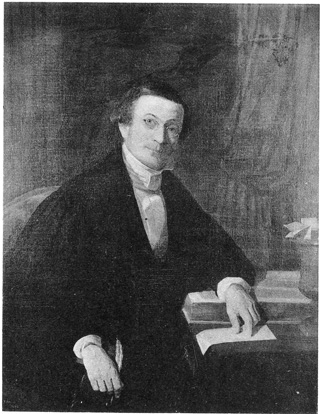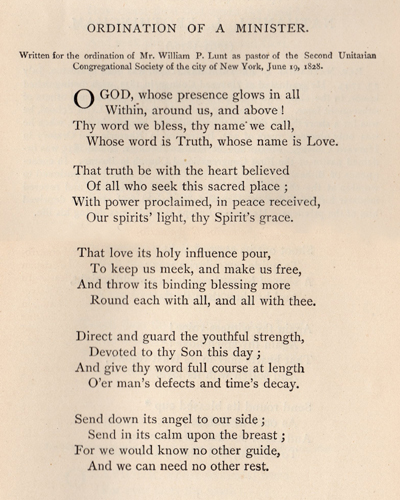Nathaniel Langdon Frothingham’s Unitarianism, 1835

At the 20th Anniversary of his ordination as Minister of the First Church, Rev. Frothingham spoke from the pulpit of the ‘Doctrine and Practice of the Church,’ a sermon of liberal moderation. He was an independent exemplar of restrained conservatism, but in accord with Unitarianism. This was his position:
‘We will not attempt to bind others, and we will not consent to bind ourselves, to think the same thoughts through all generations. [But we] ‘hold by the teaching of Christ and his disciples, leaving ourselves free to enlarge its interpretation as God shall give us light.’
[In the] ‘Unitarian Controversy’ [between the orthodox Congregationalists and the unorthodox Unitarians] ‘we remained at rest in that Schism. We [took] the ground that there was no warrant in the Scriptures for the idea of a threefold personality in the divine nature, of [need] of atonement, of man’s total corruption, or of an eternity of woe adjudged as the punishment of earthly offenses; or for any of the peculiar articles in that scheme of faith which went under the name of the Genevan reformer [Calvin].
‘We have worshipped only One, the Father; have recognized the authority of Jesus Christ as a divine Messenger; have maintained the accountability of man, and a righteous retribution, and a life beyond this. But in all these points we were adopting rather practical principles than tenets to be discussed.
We have never pretended to understand all mysteries, [nor] sought to penetrate to what is beyond us; but have been content to leave many things in that sacred obscurity in which they are left by the written Word. And even upon subjects within the range of reasonable inquiry, we have not favored a controversial tone. We have made more account of the religious sentiment than of theological opinions.
 We have been singularly conservative in our customs; mistrustful of innovations, jealous of our liberty, fond of peace, refusing to be influenced by any gustiness of the times.
We have been singularly conservative in our customs; mistrustful of innovations, jealous of our liberty, fond of peace, refusing to be influenced by any gustiness of the times.We have loved to dwell within ourselves, and disliked to implicate our concerns with those of other churches, or with any associations of men.
We have supposed that the exclusive objects of our association were to worship our Maker according to our consciences, and to maintain the sacred decency of Christian order.
We have therefore been unwilling to mix up these objects with plans of a different, however important nature.
We have been unwilling to take the stand of missionaries or propagandists in any shape.
We have been unwilling to form ourselves into a Bible society, or a temperance, or an education, or a benevolent society; or to appear as anything else than what we are, a church of Christ, an assembly for Social Worship.’
Voted to be published by the Society [of Boston First Church] for its purposes.
WIKIPEDIA